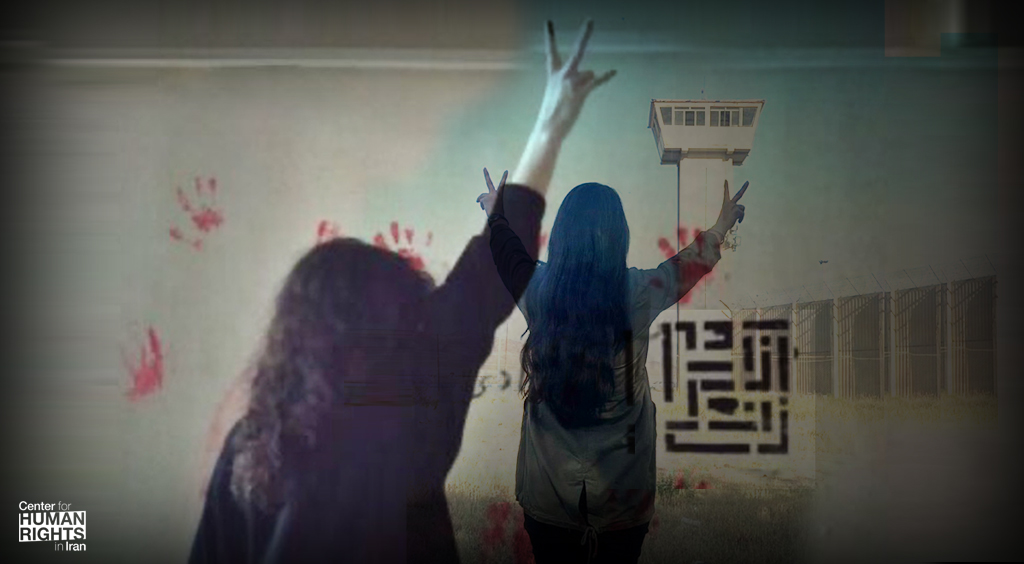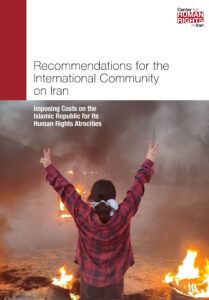
Opposition to hijab mandate grows as Iranian authorities seeks more durable measures
Women assaulted, denied entry to important companies
June 15, 2023 – Following the “Freedom of Women’s Lives” motion launched 9 months in the past, a brand new parliamentary invoice has been launched that will intensify discrimination in opposition to ladies who select to not put on the hijab in Iran, in addition to undermine basic rights resembling freedom of expression, perception, faith and affiliation.
“Iranian ladies have lengthy endured second-class citizenship in each the authorized framework and social norms, and now the federal government’s proposed invoice seeks to widen the scope of institutionalized discrimination by establishing unveiled ladies as an inferior class,” mentioned Jasmine Ramsay, deputy director of the Center for Human Rights in Iran (CHRI). “The invoice suggests that girls must be denied primary companies like entry to banks and public transport, and even imprisoned, merely for uncovering their hair.”
The requirement for girls and women to put on the hijab in Iran dates again to 1981, following the 1979 Iranian Revolution. Since then, many ladies have voiced their opposition to being compelled to put on the full-body overlaying by means of public demonstrations and on a regular basis acts of protest.
However, many have confronted important repercussions for his or her acts of peaceable civil disobedience, significantly the latest demonization by Iranian authorities of unveiled ladies, which has been on the rise because the anti-government protests that started in September 2022. These protests had been sparked by the loss of life of Mahsa Zina Amini, 22, who was arrested within the capital for improperly sporting a hijab and died in state custody.
Peaceful protests by ladies in opposition to the obligatory sporting of the hijab stay an vital facet of the Women’s Life and Freedom Movement, however those that participate in them pay a excessive worth.
In interviews with CHRI, ladies in cities throughout Iran mentioned that they had been assaulted in public or prevented from accessing primary companies just because they didn’t cowl their hair.
“A number of days in the past on the subway, a person shoved me so exhausting that I fell to the bottom as a result of I wasn’t sporting a hijab,” a girl in Tehran instructed CHRI.
“Then he dragged me… If the police hadn’t come, he would not have left me alone,” she mentioned.
All of the ladies who shared their tales with CHRI for this text selected to stay nameless, given the extraordinary persecution they’ve confronted and to guard them from potential retribution from state safety businesses for talking out publicly.
Further interviews with ladies who speak about their experiences showing with no veil in Iran can be found later on this article.
‘Chastity and Hijab Laws’ Increase Discrimination and Violence Against Women
Currently, ladies in Iran could be fined, arrested, or imprisoned for not sporting the hijab. Article 638 of Iran’s Islamic Penal Code states that “Any girl who seems in a public place or on the highway with out sporting the Islamic hijab shall be punished with imprisonment of 10 days to 2 months or a high quality of fifty,000 to 500 rials.”
Moreover, as stipulated in Article 639, if a girl refuses to put on the veil or asserts her proper to decorate as she needs, she could also be charged with prostitution or “promotion of prostitution,” against the law punishable by one to 10 years in jail.
The proposed “Chastity and Hijab” Bill takes this idea additional by deeming showing in public with out the hijab, whether or not in particular person or on social media, a hazard to society and equal to “nudity.” The Bill introduces a spread of extra penalties, together with fines, restricted entry to financial institution accounts, confiscation of non-public automobiles, journey restrictions, bans on on-line exercise and imprisonment.
 “These measures will additional intensify discriminatory remedy in opposition to ladies who select to not put on the hijab or who assert their proper to decorate in keeping with their very own preferences. The proposed invoice goals to extend management and punishment of ladies who don’t adjust to the hijab obligation, thereby perpetuating a local weather of oppression and restriction of non-public freedoms.
“These measures will additional intensify discriminatory remedy in opposition to ladies who select to not put on the hijab or who assert their proper to decorate in keeping with their very own preferences. The proposed invoice goals to extend management and punishment of ladies who don’t adjust to the hijab obligation, thereby perpetuating a local weather of oppression and restriction of non-public freedoms.
According to the proposed regulation, public servants who’re accused of not sporting the right hijab, or not sporting it in any respect, may face cuts in pay and advantages and probably lose their jobs.
Employers and their staff will probably be required to watch and implement compliance with the obligatory hijab regulation, and any violations might end result within the closure of the enterprise.
The proposed invoice particularly targets public figures accused of taking part in or selling unmasking actions, deeming their actions to be in opposition to nationwide safety and resulting in a spread of punishments, together with work bans, restrictions on social media use and even imprisonment.
These provisions reveal the far-reaching and repressive nature of the proposed regulation, because it not solely regulates particular person conduct but in addition imposes important legal responsibility and potential penalties on employers and public figures. “The regulation is designed to create an environment of concern and management, additional prohibit particular person freedoms and stifle dissent in opposition to the obligatory sporting of the hijab,” Ramsey mentioned.
Dehghan additional highlighted the invoice’s shortcomings, declaring that paragraph (a) doesn’t outline key phrases resembling “violation of social norms” or “hijab” itself. The lack of clear definitions not solely creates alternatives for manipulation and misuse of the regulation, but in addition will increase the probability of residents’ rights being violated because of the lack of readability.
In essence, the Bill not solely violates basic rights enshrined within the Constitution, however can be ambiguous and unclear, open to abuse and more likely to infringe on particular person liberties.
UN human rights consultants have strongly criticised the Islamic Republic’s observe of “criminalising refusal to put on the hijab”, stressing that it’s a clear violation of ladies’s and women’ proper to freedom of expression, which they are saying may probably result in the violation of different vital rights, together with political, civil, cultural and financial ones.
Women who’ve eliminated the veil say they’ve been denied important companies
Although the “Chastity and Hijab” invoice has not but turn into regulation, unveiled ladies in Iran are already experiencing the intense discrimination that the invoice encourages, in keeping with the CHRI research.
For instance, at universities, paramilitary teams harass and assault ladies, and college students threat receiving decrease grades or being barred from remaining exams for merely exhibiting their hair.
“They are our [student ID] “We demanded the playing cards from the scholars and warned them that they’d not be capable of take their remaining exams with out them,” mentioned one scholar at North Tehran University. “We complained to the college authorities however they refused to reply our questions. They mentioned the difficulty was for the disciplinary committee to determine, and the disciplinary committee instructed us they’d summon us when the time was proper.”
University disciplinary committees at dozens of universities throughout the nation have been spearheading a crackdown on college students and professors who’re accused of supporting protests by the Women’s Freedom of Life motion, arresting, expelling or expelling them.
“We are anxious about this problem and nervous about the way forward for our training, which has turn into a nightmare in Iran,” the scholar instructed CHRI. “Every day we concern getting into the college with out our hijabs. The college has put in no less than three extra cameras for 360-degree surveillance on the campus.”
One girl from town of Kerman mentioned that from the second she entered the hospital for her appointment, she was denied scheduled surgical procedure except she coated her hair.
“The safety chief did not permit me. He mentioned I may file a grievance in opposition to him. He mentioned the hospital belongs to the IRGC and there isn’t any level in me submitting a grievance,” she mentioned.
“Eventually, as a result of I used to be sporting a brief coat, the guards introduced me a shawl and an extended cape,” she added. “I put them on and the guards escorted me to the clinic as if I used to be beneath arrest.”
Another girl within the metropolis of Isfahan instructed CHRI that she was instructed she needed to put on a scarf to make use of Snap, an area ride-hailing service: “They mentioned we might each be fined. We had no selection however to wrap ourselves in scarves that we had in our luggage.”
Another day, the cafe she was in closed after state safety forces confirmed up.
“The cafe was crowded and nobody was sporting a hijab. Suddenly, six or seven plainclothes cops entered the cafe and loudly ordered everybody to placed on a scarf. Some of the cafe’s clients had been scared and instantly placed on a scarf, however others didn’t pay any consideration to the risk and didn’t placed on a scarf. The cops left… The proprietor was very indignant… After about half-hour, the cops returned and ordered all clients to pay and go away as they had been closing the cafe. We left and the proprietor had no selection however to shut the cafe.”
Meanwhile, folks seen as inciting riot in opposition to the hijab requirement have been sentenced to jail and other people within the movie trade banned from working.
On June 12, 2023, Souri Babaei Chegini was sentenced to 1 yr in jail by the Revolutionary Court within the metropolis of Qazvin for selling ladies’s proper to not put on the hijab. Her husband, Mohammad Reza Morad Behrouj, can be serving a one-year sentence on the identical prices.
On March 14, BBC Persian revealed court docket paperwork revealing that 52 Iranians within the movie and music industries have been barred from buying and selling contracts for his or her help of the latest protests, successfully depriving them of a legit supply of earnings.
The checklist consists of actress Taraneh Alidoosti, movie director Asghar Farhadi and musician Kayhan Kalhol.
“The Iranian authorities’s refusal to acknowledge the calls for of the Women’s Lives and Freedoms motion, which has resonated each in Iran and overseas, displays its adamant stance that the hijab must be a matter of non-public selection, not an instrument of political repression,” Ramzi mentioned.
“Such systematic denial of basic rights isn’t solely an inhumane strategy, but in addition an in the end futile technique,” she added.
“Women, women and younger folks already outnumber the older male rulers who rule by power,” she mentioned. “Regardless of the federal government’s actions, Iran’s future will in the end be formed by the very folks it seeks to oppress.”
This reporting is made potential by donations from readers such as you. Please make a tax-deductible donation at this time and assist us proceed our mission.

